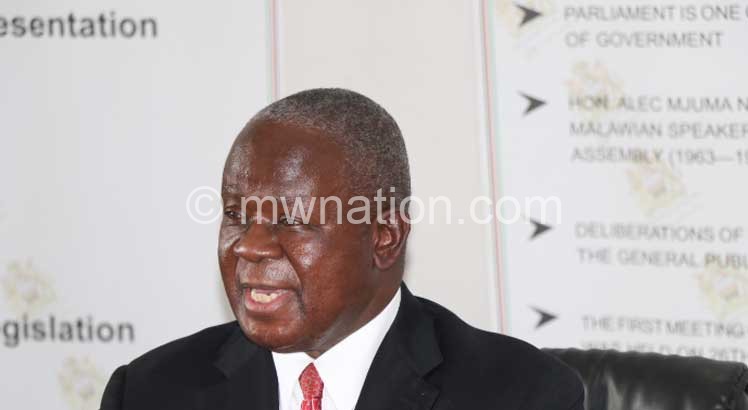Maiden Tonse budget hitches
With barely a few weeks before Finance Minister Felix Mlusu tables his second national budget, an analysis of the performance of key economic indicators of the maiden budget reveals the past 11 months have been turbulent.
The Nation analysis also reveals that despite inheriting a weak fiscal environment, frequent expenditure overruns combined with repeated revenue shortfalls have contributed to high fiscal deficits and rapidly increasing high-cost domestic debt.
Worsening the fragile situation has been Covid-19 external shock which has over the past year reduced demand for Malawi exports, increased trade costs, reduced remittances from abroad, revenue from the tourism industry as well as a shrink in foreign direct investment (FDI) inflow.

A close surveillance of major macroeconomic assumptions of the 2020/21 National Budget shows that the Tonse Administration’s first budget has been dealt a heavy blow on the projected real gross domestic product (GDP) for the year 2020 as well as on the projected exchange rate underpinning the budget framework. The budget has, however, successfully manoeuvred the projected inflation target of 9.9 percent and a policy rate target of 13.5 percent.
Macro – e c o n o m i c variables in focus
In the 2020/21 National Budget, Mlusu forecast an economic growth of 1.9 percent in 2020 and 4.5 percent in 2021.
Said the Finance Minister: “This budget, the 1.9 percent growth rate for 2020 and 4.5 percent for 2021 scenario, has been assumed, translating to a fiscalised GDP growth rate of 3.2 percent for 2020/21 fiscal year.
“This is mainly because globally, economies have started easing containment measures and restrictions on movement, thereby allowing businesses to slowly start returning to normality. Economic activity is therefore expected to pick up by September 2020.”
However, contrary to his expectation, by September 2020, economic activity had not picked up that much. In fact by December 2020, Mlusu admitted that the Malawi economy had marginally grown by 0.9 percent.
This was a downward revision from his earlier 1.9 percent growth rate estimated in the 2020/21 budget formulation.
Presenting the Mid-Year Revised Budget in Parliament on February 26 2021, Mlusu bemoaned the pressure that Covid-19 had exerted on the economy.
He said: “This economy, Madam Speaker, continues to suffer from the adverse effects of the Covid-19 pandemic which compelled government to impose containment measures, including partial lockdown and restrictions on mobility.”
Distraught with the Covid-19 effects on the economy, the minister then toned down on the 2021 projected growth rate, stating that a preliminary GDP growth rate for 2021 was now seen at 3.5 percent, one percentage point lower than his earlier projection of 4.5 percent as embedded in the initial 2020/21 budget design.
However, at 3.5 percent projected growth in 2021, Mlusu seems to be ambitious still and could be knowingly or unknowingly defying realities on the ground as international finance institutions such as the World Bank think otherwise.
The minister’s projection also contradicts that of the Reserve Bank of Malawi (RBM) which expects domestic real economic growth to strengthen to 3.8 percent in 2021 on the back of the ongoing vaccination campaign, coupled with the above-average agricultural production during the 2020/21 season as well as recovery of the global economy.
Current projections by the World Bank are that economic growth in Malawi will recover gradually to 2.8 percent in 2021 and 3.0 percent in 2022, according to the newly-framed Country Partnership Framework (CPF) for the bank and Malawi which will run from 2021 to 2025.
Economist Farai Chigaru seems to agree with the World Bank reasoning: “The GDP was forecast based on the extent of the first Covid-19 wave (that did not relatively affect Malawi significantly).
“Going forward after the [Covid-19] second wave, however, aggregate demand is expected to decrease and aggregate supply is expected to decrease, thus simultaneously reducing GDP. This simultaneous reduction entails increased unemployment.”
The central bank has already forecast that inflation is projected to average 8.4 percent in 2021, up from 7.6 percent projected in January.
The revision has, among others, taken into account the impact of the lagged effects of the recent upward adjustments of fuel prices.
And as the World Bank rightly warns, inflationary pressures in Malawi could re-emerge as food prices will continue to be vulnerable to weather shocks, although a strong 2021 harvest is expected to reduce food price pressures in early 2021.
“As global oil prices pick up, they will exert upward pressure on fuel and transport costs, as well as energy prices. In addition, increased exchange rate could contribute to imported inflation,” says the bank in the latest CPF.
Government has also done well in managing interest rates in line with the assumption in the budget framework. Malawi’s policy rate— the rate at which commercial banks borrow money from the central bank—has remained steady at 12 percent since November 2020, representing a 1.5 percentage points lower than the projected 13.5 percent envisaged by Mlusu.
Monetary authorities led by RBM Governor Wilson Banda are wary of the need to support and sustain economic recovery, while at the same time managing upside risks to the inflation.
Undeniably, the rise in the public debt over the past year could be deemed as Tonse administration’s most pressing eyesore as public debt under its regime keeps surging.
For instance, government borrowed K630 billion over a six-month period from July to December last year, pushing the Total Public Debt Stock (TPD) to K4.76 trillion, which policy analyst Alex Nkosi in an interview said was worrisome.
He said the country is spending more resources on interest payments than on critical social services. Debt servicing costs alone had increased to 35 percent of revenue and grants in the 2020/21 Budget.





